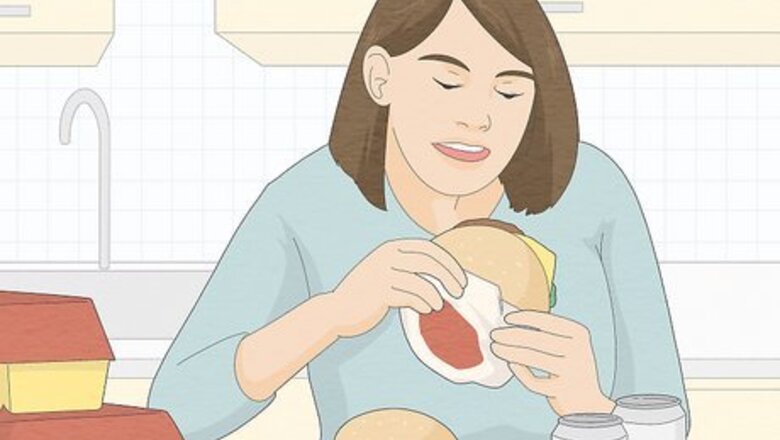
views
Signs and Symptoms
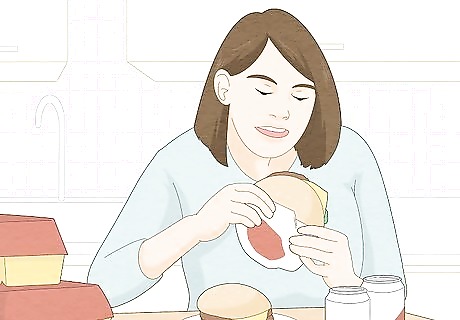
Examine your eating patterns for signs of bingeing. Binge eating, or feeling compelled to overeat, is one of the main symptoms of bulimia. Common signs of bingeing include eating large quantities of food in a short time, even when not hungry; eating alone; hoarding food; or hiding empty food containers. Don’t confuse bingeing with regular overeating. Everyone overeats sometimes, and it’s generally not considered a problem unless it is a common occurrence. Bingeing, on the other hand, is a compulsive behavior that can cause feelings of guilt, depression, or being out of control. Someone with bulimia binge eats at least once a week and continues for months. Binge eating usually involves elements of secrecy and shame. People who binge may only eat in private, buy food at different stores to conceal their habit, hide their empty wrappers and containers, or replace food so no one will know they ate it.
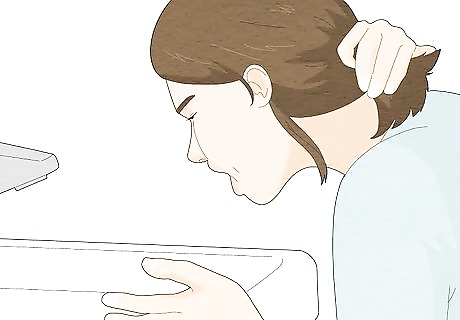
Check for signs of purging. Many people with bulimia try to make up for the excessive amount of calories consumed during a binge by purging the food afterwards, often by vomiting. The person may also abuse laxatives. Common signs of purging include regular bathroom visits after meals, tooth or gum damage, swollen cheeks, and scars or calluses on the knuckles. Some people with bulimia also purge by using laxatives, diuretics (“water pills”), or enemas.
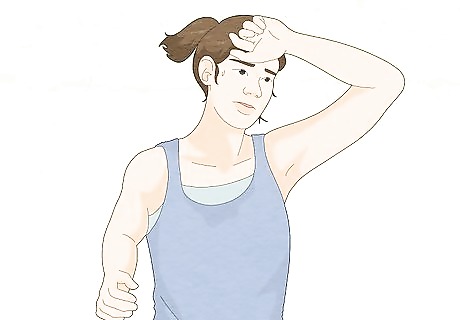
Look for patterns of fasting or over-exercising. People with bulimia don’t always purge. Instead, they may take an all-or-nothing approach to food and severely restrict their intake when they are not bingeing. Others may spend excessive amounts of time exercising to burn off the calories they consume. How much exercise is too much? While it’s healthy to maintain a consistent exercise routine, any type of workout can become destructive if it’s taken to an extreme. Disordered exercise patterns are often characterized by prioritizing exercise over other responsibilities, feeling restless or agitated when exercising isn’t possible, and continuing to work out even when sick or injured.
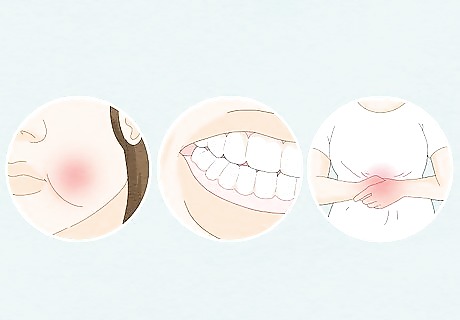
Identify physical symptoms of bulimia. Bulimia doesn’t always cause weight loss—in fact, many people with bulimia are of normal weight or slightly overweight, or they may have large or frequent fluctuations in weight. However, this eating disorder can also cause physical symptoms other than weight changes, such as: Swelling of the cheeks or jaw area Callouses on the hands or knuckles from self-induced vomiting Discolored or stained teeth Bloating due to fluid retention Stomach cramps Irritability or difficulty concentrating Dizziness, fainting, or weakness Regularly feeling cold Thinning hair, dry skin, or brittle nails Delayed wound healing Irregular menstrual periods
Risk Factors
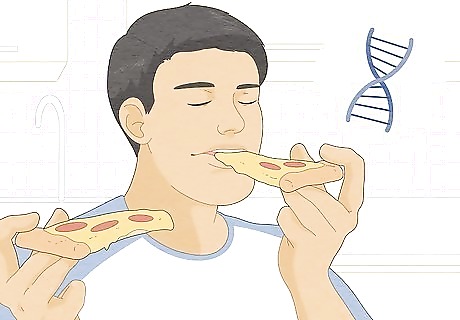
Find out if it runs in the family. Some research suggests that there is a genetic component to eating disorders. If you’re concerned that you or a loved one may have bulimia, check whether anyone else in the family has symptoms or was ever diagnosed. If eating disorders are common in your family, there may also be a family history of related conditions, like anxiety disorders, depression, and obesity.

Acknowledge negative body image issues. Many eating disorders stem from a negative body image. Someone with a negative body image may see themselves as overweight or unattractive, even if others don’t. Constant self-criticism, comparing one’s own body with other people’s bodies, and idealizing an unrealistic body type are also signs of negative body image issues. Someone with a negative body image is excessively concerned about the way their body looks. This can lead to the idea that attaining a “perfect” body would lead to a better life. An eating disorder is sometimes the result of this irrational belief. Body image issues often have their roots in early childhood. Children who are criticized for their weight may develop a negative body image that persists into adulthood. People with perfectionistic or self-critical tendencies are especially likely to have a negative body image.
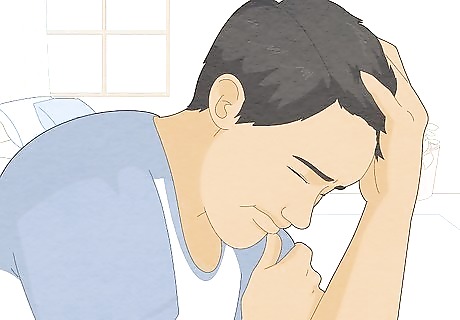
Search for indicators of low self-esteem. Low self-esteem is a big factor in the development of eating disorders. Someone with a low sense of self-worth may try to feel better about themselves by changing the way their body looks, which can lead to an eating disorder like bulimia. Signs of low self-esteem may include being hypersensitive to criticism, excessively seeking approval from others, having a pattern of turbulent relationships, or habitually being unconfident and unassertive.
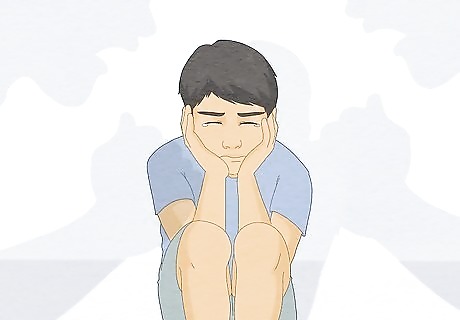
Look for signs of trauma or abuse. Trauma is a major trigger for the development of eating disorders. Not everyone with bulimia has a painful past, but many people with this condition have suffered sexual abuse or another kind of trauma. Some common symptoms of unresolved abuse or trauma include withdrawn behavior, anxiety, anger, or mood swings. It can also cause fatigue, difficulty sleeping, and vague physical symptoms such as aches and pains or a rapid heartbeat.
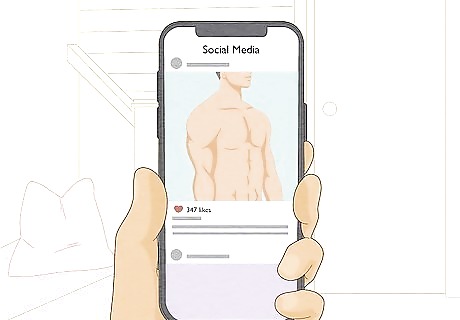
Be mindful of environmental influences. The culture or environment you live, work, or grow up in can have an impact on your relationship with food and your body. If you suspect that you or a loved one might have bulimia, look for common risk factors such as: Teasing or criticism about weight from family members, classmates, or coworkers. Living in an environment in which thinness or physical perfection is emphasized, such as a sorority or fraternity house. Working in a profession that has strict physical requirements or that focuses on physical appearance, like modeling, acting, or professional athletics or dance.
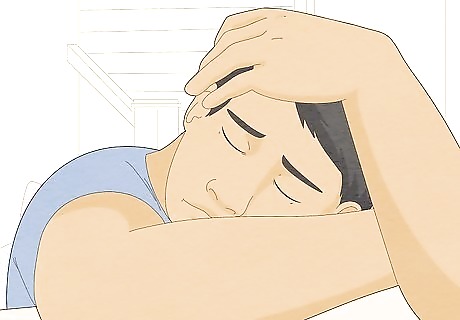
Check for mental health issues that often occur with bulimia. People with bulimia also sometimes have a variety of related conditions, such as anxiety disorders, depression, substance abuse, borderline personality disorder, or a history of self-harm. Be on the lookout for eating disorder symptoms if you or a loved one has any of these conditions. It’s not clear whether these conditions directly cause bulimia or other eating disorders, but there is a strong correlation. Getting treatment for bulimia and any related conditions at the same time may help you recover more effectively.

Spot other life stressors that may cause disordered eating. For many people with bulimia, their eating disorder started as a way of coping with stressful life circumstances. Bingeing may serve as a comfort mechanism or an escape, while purging or restricting calories restores a feeling of control. Common stressors that can cause or worsen eating disorders may include relationship problems, problems at school or work, illness, or a difficult home life.
Medical Help
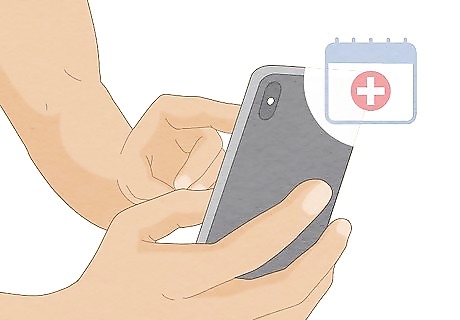
Schedule an appointment with your doctor. Bulimia can be dangerous or even fatal if it’s not treated. If you have bulimia or suspect that someone you know has it, it’s essential to seek medical help immediately. A doctor can perform a physical evaluation, help you come up with a plan for recovery, and refer you to a therapist to address the emotional aspects of bulimia. Bulimia can put you at risk of life-threatening complications, like a ruptured esophagus or irregular heart rhythms. If you are unable to urinate, have heart palpitations, vomit blood, or have black stools, call a doctor or visit an emergency room immediately. Call emergency services if you or a loved one are experiencing thoughts of suicide or self-harm.
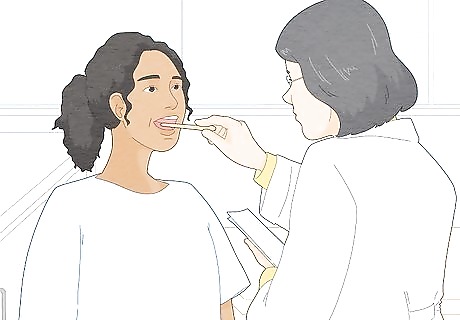
Undergo a physical examination and diagnostic testing. Bulimia can damage the body in many different ways. By performing a thorough evaluation of your health, a doctor can determine whether bulimia has caused chemical imbalances in your body or damaged your heart, bones, lungs, or mouth. A thorough physical examination can help you and your doctor determine the best path to recovery for you. Your doctor may order lab work, such as blood or urine tests, or an electrocardiogram to check for damage to your heart.
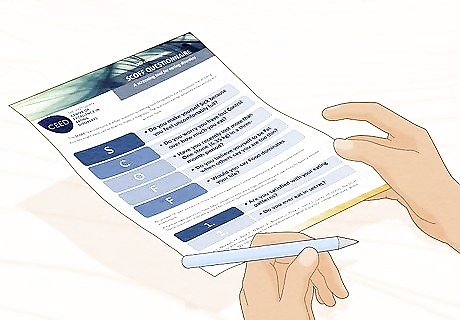
Answer questions about your eating habits and attitudes. To determine if you have bulimia or a similar eating disorder, your doctor will ask you questions about your relationship with food and eating. They may use the “SCOFF Questionnaire,” which consists of the following questions: S: “Do you make yourself Sick because you feel uncomfortably full?” C: “Do you worry you have lost Control over how much you eat?” O: “Have you recently lost more than One stone—or 14 pounds (6.4 kg)—in a 3-month period?” F: “Do you believe yourself to be Fat when others say you are too thin?” F: “Would you say Food dominates your life?”
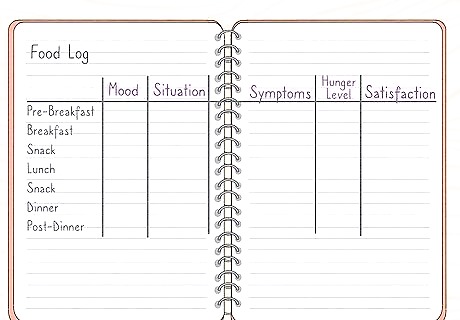
Keep a log of eating patterns to share with your doctor. Food logs are a valuable aid in diagnosing and recovering from bulimia. Writing down everything you eat, as well as your mood and thoughts at the time, helps you to stay mindful about your food choices and identify triggers that make your symptoms worse. A food log can also help a medical professional assess your eating disorder accurately. There are many ways to keep a food log. You can jot down everything you eat in a notebook, fill out sheets prepared by a nutritionist, or even use an app on your phone.
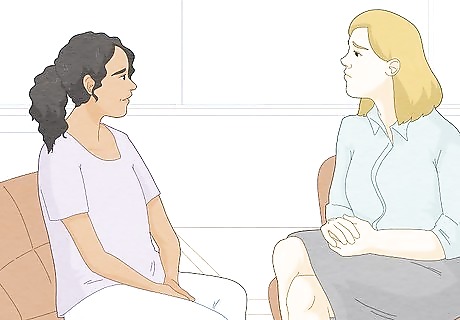
See a therapist for treatment for bulimia. A mental health professional can help you break the negative thought patterns that create and reinforce disordered eating habits. Often these negative thought patterns are too unconscious or deeply ingrained to fix without professional help. A therapist can help you create healthier thought patterns and find ways to deal with your emotions without resorting to disordered eating. Therapy can be an effective way to work through unresolved trauma, poor self-esteem, and negative body image issues, which are often at the root of bulimia and other eating disorders.

Find support. There are numerous sources of support and information on the internet. Many of these can help you find local groups where you can get face-to-face support from others who are recovering from eating disorders. Try searching here: http://www.nationaleatingdisorders.org/find-help-support or here: https://www.eatingdisorderhope.com/recovery/support-groups/online to find groups in your area or online.
















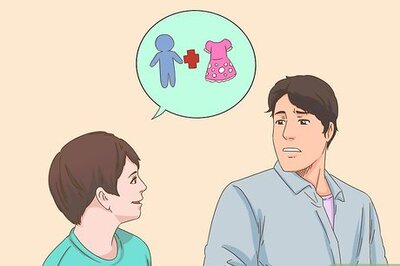



Comments
0 comment